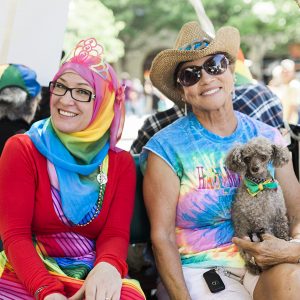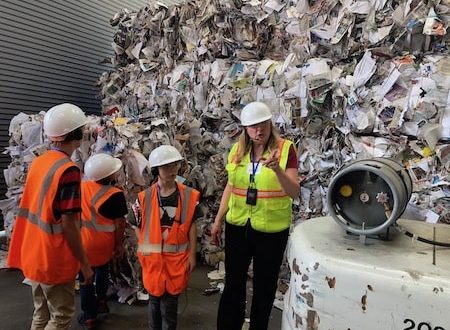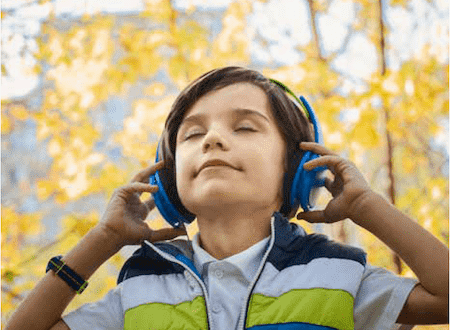Making Pupusas with Abuela
BY SUKI WESSLING
 She can’t ask her parents to call her the name she prefers.
She can’t ask her parents to call her the name she prefers.
His aunt and uncle refuse to let him join family gatherings.
They had to go live with Grandma after they were kicked out of their home.
She’s living in foster care and can’t see her old friends.
Even in liberal Santa Cruz County, gender diverse teens suffer when they come out to their families and communities. Whether the teens are coming out as gay or lesbian, deciding to live as the gender they feel inside, or asking to be called with the pronoun that fits them, families often respond with less than full support.
Ashlyn Adams, Youth Program Coordinator at the Diversity Center of Santa Cruz County, says that the problem can be as simple as getting from one place to another.
“Our public transit system is not the easiest,” Adams points out. “One family from Aromas, their student comes to our Watsonville group. His parents not only bring him to youth group and events, but they also give other students rides. To have somebody to drive so far for kids they don’t even know, that’s just awesome.”
This sort of support is important when some of the students may not have come out to their families.
Adams points out that most families support or at least “tolerate” their gender diverse students . But even teens in supportive households are navigating difficult years without an elder who shares their life experiences. That’s where the Teen Eders Project at the Diversity Center comes in.
“In talking to youth and adults all over the county, it became clear to me that there were a lot of things that were missing from people’s adolescence,” explains Adams. “The queer experience is having all the normal puberty experiences in your twenties or thirties because you didn’t get to openly feel all those feelings when you were a teenager.”
Adams organized a group of teens who take part in the Santa Cruz and Watsonville youth groups to come up with a project where they would fill in the holes left by the lack of elders in their lives.
“It’s a sort of ‘Queer Wikipedia’ where you can teach each other and learn from each other,” Adams explains. “Things as simple as ‘I learned how to make this recipe from my grandparent and you would have learned it too if you hadn’t been kicked out of your parents’ house’.”
The teens are driving the project from the ground up, locating elders who are willing to share their knowledge, writing interview questions, setting up the location, filming, editing, and sharing their projects with the world.
“It’s been pretty cool seeing people being able to share their stories and learn how personal stories can have an impact on other people who are strangers,” Adams says.
One such story comes from Malena G., a trans woman who was born and raised male in Mexico. She literally didn’t have the words for what she knew about herself. Perceiving her difference from an early age, her socially conservative family punished her for “feminine” behaviors. Eventually she found a personal outlet in making and selling pupusas. Although making pupusas at home is a “female” activity, her work was accepted because it brought money to the family.
One day an American couple approached her stand and they struck up a conversation. Malena still presented as male at this time, but the conversation with two gender diverse Americans opened her eyes.
“They gave her language that she hadn’t been familiar with before,” Adams says. Malena moved to the United States and transitioned to female—but never lost her love of making pupusas.
One day in January, she stood in front of a group of gender diverse teens and taught them the skill that had gotten her through those years of suffering. The information being imparted could certainly have been learned from a recipe or Youtube video. But the experience was much deeper than how to mix flour and water.
“We filmed her teaching us how to make pupusas and telling all of the stories that she learned as a little kid,” Adams remembers. “It was an incredible experience for the young people to see coming out on the other side of the struggle and also to learn this old form of art.”
Adams is also meeting her digital teens where they thrive.
“Young people now have enormous power, especially when it comes to communication,” she says. “There are a lot of ways they can employ that. If you’re a meme lord on Instagram now you could be changing public policy in 15 years!”
Michelle Brandt of the TransFamily Support Group experienced the need for elders while raising her trans son. She now supports parents who are struggling to understand the best way to meet their transgender children’s needs.
“Family and community support directly impact our children’s mental health and quality of life,” Brandt explains. “Gender diverse kids, even when supported by their families, face a lack of the community support that children need to thrive.”
It may be something as simple as having another trans guy to give advice on how to get a good-fitting suit for a body with hips and breasts. Maybe a teen’s school counselor can’t give advice on being a gender diverse person on a college campus. Many teens hear the scary stories but don’t know queer elders who have come out from the struggle to live happy, fulfilled lives.
“Our elders could have been legally fired and family rejection was very common,” says Sharon Papo, Director of the Diversity Center. “I think it’s important for young people today to understand whose shoulders they stand on and the incredible strength and courageousness of the trailblazers of our movement.”
Brandt sums up the value of the Queer Elders Project by reminding us that community needs to be nurtured.
“Queer elders are an integral part of the village that we depend on to help nourish our children and help them live their fullest lives.”







